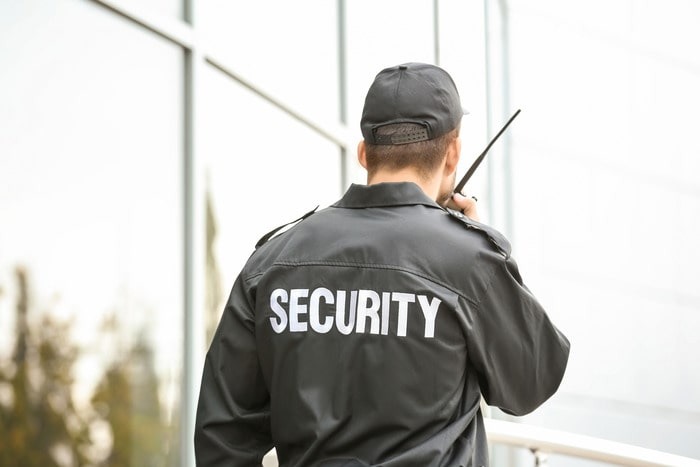What is a Security Guard?

A security guard plays a crucial role in ensuring a safe and secure environment across various settings, such as commercial properties, residential complexes, events, and public spaces. Their primary responsibilities include deterring unauthorized access, preventing theft, vandalism, and addressing other security threats. Security guards typically engage in routine patrols, monitor surveillance systems, and enforce regulations to safeguard both people and property.
In their day-to-day work, security guards may respond to alarms, disturbances, and emergencies, taking appropriate actions to resolve situations and alert law enforcement when necessary. Additionally, they often provide customer service by assisting visitors or employees, checking identification, issuing visitor badges, and offering directions. While some security positions may involve armed guards, many work unarmed and rely on their observation skills and conflict resolution techniques to ensure safety.
Duties and Responsibilities
Security guards are responsible for a variety of tasks to maintain safety and security:
- Surveillance and Monitoring: Observing their assigned area and using surveillance equipment to prevent security breaches and unauthorized access.
- Access Control: Managing entry points by checking identification and issuing visitor badges to ensure that only authorized individuals enter.
- Patrols: Conducting regular patrols to deter threats and quickly identify any unusual activities.
- Emergency Response: Acting as first responders in emergencies, assessing situations, assisting those in need, and contacting law enforcement or emergency services.
- Conflict Resolution: Utilizing conflict de-escalation techniques to peacefully resolve disagreements or disturbances.
- Reporting: Documenting incidents and maintaining accurate records of daily activities and security occurrences.
- Safety Checks: Ensuring that emergency equipment, fire exits, and alarm systems are functional.
- Customer Service: Interacting with the public and providing information and assistance to enhance the overall safety experience.
- Preventive Measures: Implementing measures such as locking doors and securing windows to reduce security risks.
- Collaboration with Law Enforcement: Working with law enforcement during serious incidents to assist with investigations.
- Training and Drills: Participating in training and drills to stay prepared for various emergency situations.
- Adherence to Regulations: Knowing and ensuring compliance with relevant laws and regulations related to security and privacy.
- Maintaining Order: Enforcing rules in crowded settings to ensure the safety of attendees at events or public venues.
- Property Protection: Monitoring areas to protect against theft, vandalism, and damage.
- Deterring Criminal Activity: Utilizing their presence to deter potential criminal activities.
Types of Security Guards
Security guards operate in specialized roles based on their environment and responsibilities:
- Unarmed Security Guards: These guards maintain security without firearms, focusing on observation, access control, and conflict resolution. Commonly found in commercial and residential areas.
- Armed Security Guards: These guards are licensed to carry firearms and work in high-security environments, such as banks or government buildings. They are trained in firearm safety and responding to armed threats.
- Event Security Guards: Hired for events like concerts and sports, they ensure the safety of attendees by managing access points and monitoring crowds.
- Retail Security Guards: Working in retail environments, they prevent theft and disturbances by monitoring surveillance cameras and engaging with customers.
- Corporate Security Guards: These guards protect office buildings and corporate facilities, managing access and conducting security checks.
- Hospital Security Guards: In healthcare settings, they ensure the safety of patients and staff, managing access to restricted areas and responding to disturbances.
- Residential Security Guards: Focused on gated communities and apartment complexes, they provide security through access control and patrols.
- Educational Institution Security Guards: Working in schools and universities, they maintain a safe learning environment and prevent unauthorized access.
- Transportation Security Guards: Ensuring safety in transportation hubs like airports, they manage security checkpoints and monitor baggage.
- Hotel Security Guards: Responsible for the safety of hotel guests and property, they respond to guest requests and manage access to facilities.
- Industrial Security Guards: Working in manufacturing and warehousing, they prevent theft and ensure compliance with safety protocols.
- Bodyguards: Providing personal protection to high-profile individuals, bodyguards focus on preventing threats to their clients.
Information provided by CareerOnlines, LLC and other sources.
Sections of this page includes information from the O*NET 29.0 Database by the U.S. Department of Labor, Employment and Training Administration (USDOL/ETA). Used under the CC BY 4.0 license.
CareerOnlines, LLC has modified all or some of this information. USDOL/ETA has not approved, endorsed, or tested these modifications.